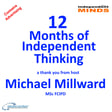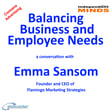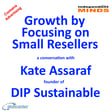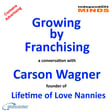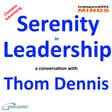
Leadership Is Not Enough– a conversation with author Dr James Chitwood
An Operator’s Guide to a Performance Culture
Dr James Chitwood is an Army Veteran, former university president, and sales operations expert who helps organizations build systems that drive measurable performance.
In this episode of The Independent Minds James Chitwood and host Michael Millward explore the role of leadership in organisations.
They discuss
- How leadership and employee development is different in the military and the civilian environments.
- The dynamic between leadership and management
- How training and development activities can be most effectively delivered,
- Learning organisations
- The T.R.A.C model which is described in Leadership is not Enough - Training - Recognition - Accountability - Communication
- The role of training departments in organisations of all kinds
- How the education system can help organisations create employees who on a lifelong learning journey.
James concludes by introducing Michael to Bruno Boddington Chitwood.
More information about James Chitwood and Michael Millward is available at abeceder.
Audience Offers – listings include links that may create a small commission for The Independent Minds
Buy Leadership Is Not Enough: An Operator’s Guide to a Performance Culture by Dr James Chitwood at Amazon
The Independent Minds is made on Zencastr, because as the all-in-one podcasting platform, Zencastr really does make creating content so easy.
If you would like to try podcasting using Zencastr visit zencastr.com/pricing.
Travel
With discounted membership of the Ultimate Travel Club, you can travel anywhere at trade prices on flights, hotels, trains, and many more travel related purchases.
Fit For Work We recommend The Annual Health Test from York Test; a 39-health marker Annual Health Test conducted by an experienced phlebotomist with hospital standard tests carried out in a UKAS-accredited and CQC-compliant laboratory.
A secure Personal Wellness Hub provides easy-to-understand results and lifestyle guidance
Visit York Test and use this discount code MIND25.
Visit Three for information about business and personal telecom solutions from Three, and the special offers available when you quote my referral code WPFNUQHU.
Being a Guest
We recommend the podcasting guest training programmes available from Work Place Learning Centre.
We use Matchmaker.fm to connect with potential guests If you are a podcaster looking for interesting guests or if you have something interesting to say Matchmaker.fm is where great guests and great hosts are matched and great podcasts are hatched. Use our offer code MILW10 for a discount on membership.
We appreciate every like, download, and subscriber.
Thank you for listening.
